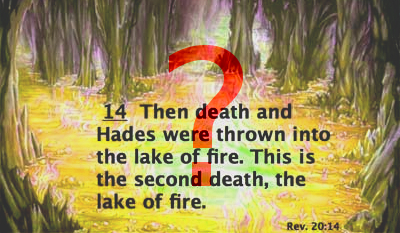“But the fearful, and unbelieving, and the; abominable, and murderer, and whoremonger, and sorcerers, and idolaters, and all liars, shall have their part in the lake which burneth with fire and brimstone; which is the second death.”–Rev. 21:8
“And I saw the dead, small and great, stand before God’; and the; books were opened; and another book was opened, which is the book of life; and the dead were judged out of those things which were written in those books, according to their works. And the sea gave up the dead which were in it; and death and hell delivered up the dead that were in them, and they were judged every man according to their works. And death and hell were cast into the lake of fire. This is the second death.”–Rev. 20:12-14.
J.W. Hanson
From Bible Threatenings Explained
Popularly “hell” and the “lake of fire and brimstone” are the same thing; but it is seen, as we read the description in Revelation, that they are entirely different. In chap. 20, verses 13 and 14, it is said that “death and hell were cast into the lake of fire. This is the second death.”
There are four opinions as to what the second death is.
1. Some suppose it refers to those who, having once been dead in trespasses and sins, have become quickened into newness of life, and then have returned to their wicked ways.
2. Others apply it to the apostasy of the Christian church.
3. Others to the second destruction or death of the Jewish people, which soon occurred.
4. Others refer it to the endless torment of the soul after death.
This last view is evidently incorrect, for a man’s death in trespasses and sins is the first death, the dissolution of the body is the second death, and the endless torment of the soul would be the third death, if the term death were allowable. But it bears no resemblance to death, and if such a fate were in store for any it could not be called death.
The first, second, or third opinion may be adopted. Jude describes those who were “twice dead, plucked up by the roots.” Such are all who have once been good, and who have fallen into evil ways.
We favor the first or third view indicated above; but whichever view we take, the popular one has no warrant in the language employed.
The careful reader of the book of Revelation will see that this second death is a temporal destruction to befall the Jewish nation soon after the book was written. The Apocalypse was written just before Jerusalem was destroyed by the Romans. It had once before been laid waste. The Jewish nation had lost its national life, and now it was to pass through a similar experience, undergo a second death, which it did when Titus (A.D.70) overwhelmed the people, and inflicted national death on the Jews. The first death lasted seventy years, the captivity in Babylon; the second has lasted now eighteen centuries, and justifies the term everlasting.
The first death is described by the prophet Ezekiel, chap. 37:12-14: “Therefore prophesy and say unto them, Thus saith the Lord God: Behold, O my people, I will open your graves, and cause you to come up out of your graves, and bring you into the land of Israel. And ye shall know that I am the Lord, when I have opened your graves, O my people, and brought you up out of your graves. And shall put my spirit in you, and ye shall live, and I shall place you in your own land; then shall ye know that I the Lord have spoken it, and performed it, saith the Lord.”
The second death was when the Jews were again extinguished as a nation. The revelator declares it was to be very soon.
“And behold, I come quickly; and my reward is with me, to give every man according as his work shall be. He which testifieth these things saith, Surely I come quickly.”–Rev. 22:12-20.
Jesus thus announces the same event: “And then shall appear the sign of the Son of man in heaven; and then shall all the tribes of the earth mourn, and they shall see the Son of man coming in the clouds of heaven with power and great glory.”–Matt. 24:30.
John says: “Behold, he cometh with clouds;” Jesus says: “The Son of man cometh in the clouds of heaven;” John: “And all the kindred of the earth shall wail because of him;” Jesus: “And then shall all the tribes of the earth mourn.”
In Rev. 21:8, the same idea is taught. “The fearful, unbelieving,” etc., are to be burned in “the lake of fire, and this is the second death.” The lake of fire denotes the fearful judgments of those days during which the Jews experienced their second death. Or, it may be used as a figure, and denote the idea marked “1” above.
